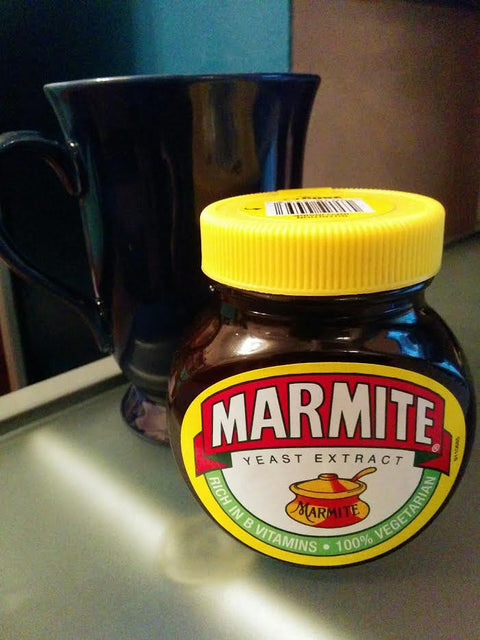So, Brexit, that's a thing! This is part three of a possibly-never-ending series of articles about being a business in Brexit Britain. Part one was pre-Brexit, here. Part two was the immediate aftermath, here, in which we developed our badly drawn Brexit boat. Then I got on with some work while all our political parties went nuts for a few months. Welcome to part 3, which is inexplicably about Marmite.
Marmite was big news last week, as Brexit chickens came home to roost and horror of horrors, it vanished from some supermarket shelves for a while.
Now, I'm going to have to explain some background here for folks new to this, sorry regular readers.
1) The purpose of businesses is to make a profit, not to provide a service or a product. It's easy to forget this because none of our market ourselves as profit-making-machines.
2) Our country, the UK, voted out of the EU several months aback. Even the people in favour of this agree the actual process is a tiny bit messy, and our currency is falling against the US dollar and the Euro as a result.
3) Marmite, like KMD, is culturally British, and notoriously you either love it or hate it. I happen to hate it, my flatmate loves it, hence I have a jar. I'm a big fan of their marketing either way because seriously, who wants to be bland?
4) Last week in the UK the big news story was that Unilever (large overseas corporation that owns a shedload of products and brands) was in a fight with Tesco (very successful British supermarket) over prices. This fight ended up mostly about Marmite because its a product that holds a special place in our hearts, and also because its made in the UK, so that confused people immensely.
If it's British and it's made in Britain why would a fall in the currency mean the price goes up?!
I don't have any interest in either Tesco or Unilever so I can't promise you that any of this is accurate, but I can extrapolate from our experiences here at the teeny tiny end of business in the UK because hey, why not!
To follow my argument, you're going to need to understand what "fall in the currency" means. If you already know that, skip to the next picture because this paragraph will be really dull.
National currencies are traded on money markets which are quite frankly, things I don't fully understand, though happily neither does anyone else, which is why they do things we don't expect. What we do know is that they don't like uncertainty and at the moment, no-one know what conditions UK companies will be facing in about two and half years, which means anything you do in this country could end really badly. This means no-one likes us much, business-wise, so our currency isn't worth as much as it was when everyone knew, more or less, where we stood and what we were up to. Obviously it's a billion times more complicated than that but we could be here all day. Fight it out in the comments if you have passionate forex opinions.
I'm going to round the numbers to keep the sums easy because sums are not my strong point. Let's use the US dollar - British Pound (GBP or sterling) as an example. Pre-voting, you could get about one and a half dollars from the bank for your pound. If you take them a pound now, you'll get more like one dollar and 20 cents. So if I was buying something that costs $15, pre-Brexit it would have cost me £10. Now it would cost me £12.50. That's effectively a price increase of 25%. And that's what "The British currency has fallen" means; it means when we buy things in other currencies, they cost more than they used to.
In real life of course, there are also banking fees, minor fluctuations, occasionally good deals from organisations who may or may not have gamed the system effectively, and a variety of really complicated corporate fiscal shenanigans that companies get up to to protect themselves from unexpected 25% price increases.

Silk tap pants by Ayten Gasson, Demi-Corset by us.
So how can a British product end up affected by things costing more in dollars and euro? Here's just a few possible ways:
1) The company that owns the product is overseas. If you're paying them in pounds, where they were getting £10 from you, they were making $15, and now they're only making $12.50. So you're paying them the same amount but they've just taken a huge cut in prices. That can be a bit awkward.
2) It's very rare for a company, even one as little as us, to individually price everything up and negotiate each price separately. The most obvious example of that is bras; we sometimes do 27 sizes and believe me, they do not all come out the same price. But we don't charge a different price on every size. We average it out. Unilever was, by all accounts, negotiating an overall price increase across thousands of products, regardless of individual variation.
2) Made in the UK doesn't mean everything in it is British. The silk knickers in the picture above? wholly made in the UK, but you can't make the silk they are made from here. Silk, like most things, is imported, because we're just not that big of a place.
BUT WAIT, I hear a bunch of you saying, Marmite is mostly made from a product left over from making beer (now there's a booming UK industry), so if the core ingredient is British and it's made here surely the price is based on the British currency and can't be affected by overseas issues.
Well, no. Even in lingerie the price of a product is not mostly about its core ingredient (fabric) or just the cost of that plus the labour to make it. Into that are a pile of hidden costs; in food, the processing and the packaging are pretty major components. Now, the chances of the glass jar, labelling and plastic lid Marmite comes in being British are pretty much zero. We just don't bother mass manufacturing that stuff here anymore, everyone outsourced it to cheaper countries years ago. Which means that's going to be priced in, most likely, US dollars, or possibly euro. It also seems deeply unlikely that we're using locally sourced British sea salt for that extra kick; a quick google says most catering supplies of salt come from the US and China, both of which charge in, you guessed it, US dollars, as do the importers who would ship it here; though it might be bought from a distributor here who passes on the prices in pounds, ultimately it will have gone up.
You may have noticed, by the way, that there's a lot of hauling stuff around in this. Getting ingredients or components around the world to the place where you assemble them, and then getting that product back out across the country or globe is a hidden cost in every product. Travel costs are based on the price of oil which is, you guessed it, priced in US dollars.
Oh, and long term? As with industrial sewing machines, it's highly unlikely that the equipment used to churn enormous vats of tasty, tasty and/or revolting marmite, depending on your experience, were made in the UK, or can be replaced by UK equipment. Repairs, spares and updates are going to cost more.
And that, my friends, is one of many, many reasons why we weren't impressed by Brexit. Because when you spend pretty much every day shifting stuff about in order to come up with a finished product, you get to learn very fast that the UK is a pretty small island that doesn't produce many of the things key to modern living standards, and that is really quite awkward if your currency starts sliding down about like a stocking from a broken garter belt.
Hopefully, the government will announce plans to completely revamp our industry to fix this, but it's going to be a long slow slog because we've pretty much dismantled manufacturing stuff in the last 30 years in the UK. In the meantime, over the course of the next few months, expect price rises of anything from 5-30% on... well, pretty much anything, really. I believe the President of the EU recently suggested that we cannot both have our cake and eat it, and it would appear he might actually be right.
Relevantly, the UK has only a handful of lace manufacturers left, all small-scale (which to the best of my knowledge all use threads from overseas), two elastics factories (ditto) and precisely no-one making metal suspender bits, and if it did have one we'd likely need to import the ore to get the metal to make them from!



